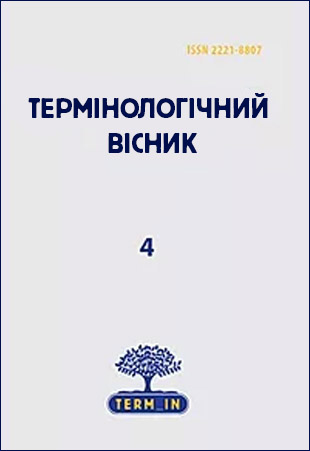Transfer of Terms in Formation of Modern Terminological Systems

Founders
National Academy of Sciences of Ukraine,
Institute of Ukrainian Language of NAS
Publisher
Institute of the Ukrainian Language of National Academy of Sciences of Ukraine
Scientific journal Ukrainian Language is registered by the Ministry of Justice of Ukraine as print media (Certificate: Series КВ № 12180 – 1064 ПР of January 12, 2007).
Included in the list of printed scientific specialized editions of Ukraine (Order of MES of Ukraine no528 from 12.05.2015)
Back side of the journal
Valentina Maslova
Information about the author:
Doctor of Philology, Professor of Vitebsk State University named after P.M. Masherov (Vitebsk, Belarus)
e-mail: mvavit@tut.by.
Title: Transfer of Terms in Formation of Modern Terminological Systems
Rubric: Theory and History of Terminology
Abstract: The article analyzes the two terms, which have become extremely popular in cultural linguistics, the transfer and the code, as well as the possibility of their use; the fact of transfer origin is the most important trend in the formation of terminological systems.
Сultural transfer is the process of transferring knowledge between different cultures, professional communities and discourses. The methodology of transfers implies the identification of mechanisms for the “cultural transfer of meanings.” The problem of the convertibility of knowledge between different cultural practices and areas of humanitarian knowledge (philosophy, semiotics, linguistics, philology, ethnography, etc.) arises in connection with the synthesis of knowledge, their penetration from one area to another.
In this regard, the general humanitarian theory of the “cultural transfer”, which was developed in the 80s by French historians and literary scholars M. Espan and M. Werner, is becoming a promising approach to the analysis of interscientific interactions in a globalized scientific and cultural space. Now the term is widely used in such areas of scientific knowledge as translation theory, psychology, history, linguistics, banking, tourism, economics, educational environment, politics, management, etc.
Transfserization of terms is one of the most productive ways of creating a terminology system for linguoculturology. The formation of a metalanguage of 11 such an integrative discipline as linguoculturology has its own specifics, which can be described as an interdisciplinary transfer in the course of which the various terms that lead to their development in a new scientific environment are conjugated and correlated. As a result, an important scientific idea about the holistic reflection, born of the integrated knowledge about the interaction of a person, his consciousness, culture and language, ripens.
Keywords: term, terminology, transfer, code, linguoculturology.
References:
- Gudkov, D., Kovshova, M. (2007).Telesnyj kod russkoj kul’tury. Materialy k slovaryu. Moscow: Gnozis (in Rus.).
- Dem’yankov, V.Z. (2015). Yazykovye sledy transfera znanij. Kognitivnye issledovaniya yazyka. № 23, 17–29 (in Rus.).
- Zykova, I.V. (2016). Formirovanie metayazyka lingvokul’turologii: principy mezhdisciplinaronogo transfera ponyatijnogo apparata. In Lingvistika i semiotika kul’turnyh transferov. Metody, principy, tekhnologii (pp. 181–202). Moscow: Kul’turnaya revolyuciya (in Rus.).
- Kovshova, M.L. (2012). Lingvokul’turologicheskij metod vo frazeologii. Kody kul’tury. Moscow: URSS (in Rus.).
- Maslova, V.A., Pimenova, M.V. (2015). Kody kul’tury v prostranstve yazyka. Seriya “Konceptual’nye i lingval’nye miry”, ser. 9. St. Petersburg (in Rus.).
- Vandries, Zh. (1964). Yazyk. In Zvegincev, V.A. (1964). Istoriya yazykoznaniya XIX – XX vv. v ocherkah i izvlecheniyah (Vol. 1, pp. 440–459). Moscow (in Rus.).
- Teliya, V.N. (1999). Pervoocherednye zadachi i metodologicheskie problemy issledovaniya frazeologicheskogo sostava yazyka v kontekste kul’tury in Teliya, V.N. (Ed.) (1999). Frazeologiya v kontekste kul’tury (pp. 13–24). Moscow: Yazyki russkoj kul’tury (in Rus.).
- Feshchenko, V.V., Bochaver, S.Yu. (2016). Teoriya kul’turnyh transferov: ot perevodovedeniya – cherez cultural studies – k teoreticheskoj lingvistike. In Feshchenko, V.V. (Ed.) (2016). Lingvistika i semiotika kul’turnyh transferov. Metody, principy, tekhnologii (pp. 5–35). Moscow: Kul’turnaya revolyuciya (in Rus.).
- Espagne, M. (2010). Introduction. Transferts culturels et comparatisme en Russie. Slavica Occitania, № 30.
- Моser, W. (2014). Pour une grammaire du concept de «transfert» appliqué au culturel. In Gin, P., Goyer, N. & Moser, W.(Ed.) (2014). Transfert. Exploration d’un champ conceptuel (pp. 17–23). Ottawa (in French).


